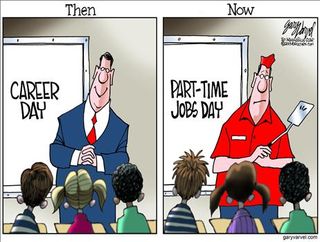I received some great feedback on the most
recent WorkPuzzle discussion. It seems this topic has struck a cord with several
of you.
First, I received confirmation the
“defacto brand” of real estate being a destination for people who want to work
part-time is far from dead. In fact, in
many markets across the country, this branding is alive, well, and being
promoted.
As the real estate industry has started
recovering, there are some companies are who are eager to get back to business
as usual. They feel comfortable and
excited about the prospects of inviting any and all individuals (part-time,
full-time, qualified, unqualified etc.) into their offices. It’s back to the "in one side, and out the
other” conveyor belt of agent hiring.
This reality is unfortunate for those
companies who are trying to build high-quality teams. It’s hard enough to overcome the history of
the real estate industry without having to continually compete with those
promoting the lowest common denominator in terms of talent, commitment, and
focus. Unfortunately, candidates will
continue to be confused and high-performing hiring managers will have to work
harder to get their message to the right people.

Secondly, I received some feedback that
some of you may not be convinced the part-time / underemployment nature of
corporate America is as dismal as I’ve described it. In turn, they don’t seem
to have the confidence to sell a real estate career as a compelling full-time
alternative to the languishing that underemployment produces in the traditional
job market.
I think some of the data I cited in
previous discussions would support this assertion, but perhaps a real-life example
would help convince the remaining skeptics.
I was discussing this issue with one of
our company’s partners who also owns a large retail establishment in the
Seattle area. As an owner in that
business, he makes frequent deposits to the local branch office of a large, publically
traded bank.
This activity has allowed him to strike up
several conversations with the tellers and other employees in the bank. Recently, he made a deposit a couple hours
later than his normal time and noticed the bank was nearly empty of
employees. He asked the teller,
“Where is everyone? It doesn’t seem you have many tellers working
today.”
She replied.
“They’re off work right now, but they’ll
be back right before lunch to start the next portion of their shifts.”
More discussion ensued, and it became
evident the bank had learned to track the frequency and time of day of
transactions to the point where they could predict the workload of each teller
at any point in the day.
Naturally, it only made sense to have
their part-time employees work during times when those transactions were taking
place. A common employee schedule was
working an hour, taking two hours off, working two more hours, taking two hours
off, and then working two hours to finish up the day. By the end of the week, each employee has
worked 25 hours. They are comfortably in
the range where the employer can avoid paying benefits.
This may seem brilliant from the
employer’s perspective, but it is abusive from the employee’s perspective. What
kind of employees would accept this kind of work schedule? It is only those who do not see themselves as
having other employment options. There must be a lot of those individuals
available because they have no problem keeping positions filled.
As a real estate hiring manager, you have
a compelling alternative for some of these individuals. We all know that becoming a real estate
agent is not for everyone, but for some people it could be a wonderful escape
from employment situations where they are languishing.
To connect with these individuals, sell the
agent employment opportunity as the full-time alternative to what they have
been experiencing or will be experiencing in the corporate job world.
Join the WorkPuzzle Discussion at the Tidemark Online Community (TMOC)
Engage in the WorkPuzzle discussion by joining the TMOC private social network. Commenting on a public blog like WorkPuzzle can be a little intimidating, so why not join the discussion inside the privacy of the TMOC discussion group?
By joining TMOC, you'll get to see who else is in the group and your comments will only be seen by those whom you trust. Joining TMOC is quick, easy, and free (no kidding…this takes less than 2 minutes). To get started, click here.
Already of a member of TMOC? If so, join the WorkPuzzle Dialog Group by clicking on the WorkPuzzle Group icon on the left side of your TMOC homepage. Questions? Email the WorkPuzzle editor (workpuzzle@hiringcenter.net) and we'll walk through the process.
 Editor's Note: This article was written by Ben Hess. Ben is the Founding Partner and Managing Director of Tidemark, Inc. and a regular contributor to WorkPuzzle.
Editor's Note: This article was written by Ben Hess. Ben is the Founding Partner and Managing Director of Tidemark, Inc. and a regular contributor to WorkPuzzle.

